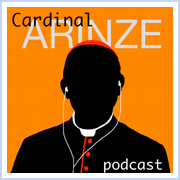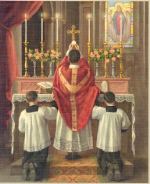The Christ-like Catholic (1st Sunday of Advent)
"Look up, and lift up your heads, because your redemption is at hand." St. Luke, 21:28
A famous artist once met a friend walking dejectedly with his head hanging down, a perfect picture of disappointment, discouragement and depression. He had the air and carriage of one who had made a great mistake, a mistake he felt it impossible to correct.
The artist took an interest in this friend. He wanted to help him. He studied the discouraged man, got to know him more intimately, and then set to work painting a portrait. When the painting was completed the artist invited his friend to his studio, and announced with pride: "This painting is my masterpiece. I shall never do anything better."
The artist drew aside the curtain, and there the discouraged man saw himself on the canvas. Yes, it was himself; yet, it was not himself. It had his figure and features, but the head was erect, the shoulders thrown back, the eyes were bright and hopeful, and the mouth was determined and turned up at the corners. There was ambition and desire in every line.
"You think I am like that?" asked the friend. "Do you see all that in me?"
"Yes," came the quiet, confident answer of the artist.
"Then," declared the despondent one, with a ring of determination in his voice, "in God's name, I'll be that which you see in me."
Today Christ tells us to "look up, and lift up your heads," and He tells us the reason, "because your redemption is at hand." That redemption means especially the coming of Christ the Redeemer at Christmas. But Christ can come and go a thousand times with no benefit to some of you, unless you decide to live according to the plan and program laid down by Christ. No doubt many of you are discouraged and disappointed with your own failure to live up to the high calling of a Christian and a Catholic. Some of you express it like this:
"Father, I seem to make no progress."
During the Church year which we begin today, we intend to consider some of the means to a better Catholic life. We intend to consider Prayer, Precepts, and Virtues. Like that artist, who painted a picture of his friend as that friend wanted to be, we will paint a picture of the practical, Christ-like Catholic, the kind you ought to be, the kind you want to be. Don't be disheartened if it seems too difficult. Make a start. "Look up and lift up your heads." We intend to consider this year:
1. The six principal precepts or commandments of the Church.We hope there are very few, if any, among you who belong to that class of Catholics who are content with attending Sunday Mass and receiving Holy Communion two or three times a year. Outside of that they make no effort to be Christ-like. To such Church laws are not necessary or obliging. Prayer? Never think of it. No time for it. We hope you are not one of these anaemic, tubercular, jelly-spined, rubber-legged Catholics, who do the very least possible for their souls and still call themselves Catholics.
2. We will consider the meaning of prayer, its kinds, its need, its blessing.
3. We intend to explain each part of the Our Father, and also to say a few words about the Hail Mary.
4. We will spend a lot of time and thought on the virtues, those powers of the soul which make us like Christ, His Mother and His saints.
5. Again we will listen to the Eight Beatitudes or ways to happiness as Christ tells them to us in the Sermon on the Mount.
6. What is conscience? What is sin? What is mortal sin? What is venial sin? What do we mean by cooperation in sin? These are some of the vital questions we will attempt to answer.
7. Then the capital sins will be considered.
8. Lastly we will outline a program for a Christ-like life.
Christ wants whole-hearted followers. He wants men and women who will serve Him out of love and sincerity, who will generously and lovingly follow His program and His plan as we explain it this year.
Our Catholic religion is so definite, clear-cut and so complete. It lays out the program as Christ laid it out. It gives us helps to follow that plan, the helps given by the God-man Himself.
Men are looking for a way of life. They want to know what to do and how to do it. They want to know what is right and what is wrong. Too many flounder around with this way of thinking and that way of living. They grab at one system or another only to find that it fails them.
Thank God, we of the Church which Christ founded have His plan and His way, which we will try to explain during the coming year.
The artist of our story painted a picture of his despondent friend, a picture that showed him how he wanted to be, how he ought to be. The picture for you and me is the picture of Christ. Behold His statue there, the Christ we want to be like. Keep Him before you all through this year. What we explain is what Christ was and what Christ wants us to be. Ask Him to make you like Him more and more every day. Look up to Him, lift up your eyes to Him. He is your redemption in this world and your salvation in the glory of the next. Amen.
__________________________
Adapted from Prayer, Precepts and Virtues by Fr. Arthur Tonne (1949)











